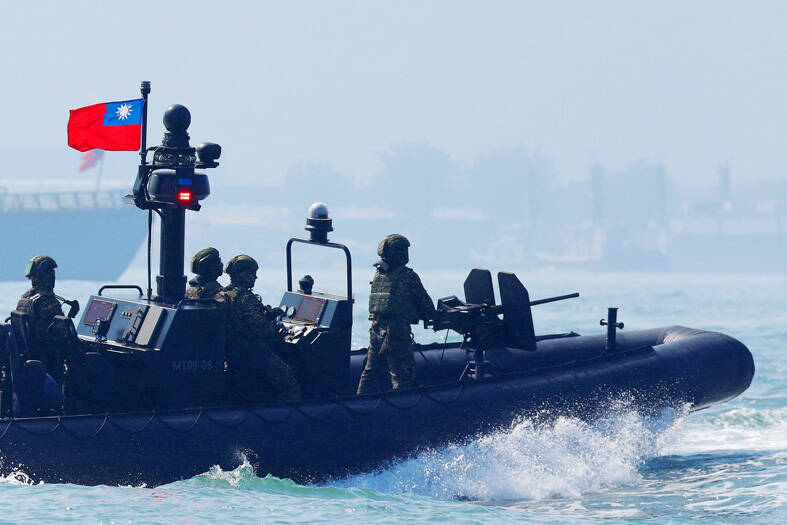Democratic Progressive Party (DPP) lawmakers have proposed an amendment to toughen penalties for military officials found guilty of treason.
Current punishments are too lenient and do not serve as a deterrent, legislators told a meeting of the Legislative Yuan’s Foreign Affairs and National Defense Committee yesterday, citing the case of former army colonel Hsiang Te-en (向德恩).
Hsiang was found guilty of accepting bribes and signing a letter of surrender swearing allegiance to the People’s Republic of China as his “motherland.” The Kaohsiung District Court in February last year sentenced him to seven-and-a-half years in prison and ordered him to pay NT$560,000, the equivalent of what he received in bribes.

Navy personnel take part in a demonstration for the media near a military base in Kaohsiung on Jan. 31.
Photo: Carlos Garcia Rawlins, Reuters
DPP legislators Wang Ting-yu (王定宇), Michelle Lin (林楚茵) and Chen Kuan-ting (陳冠廷) proposed increasing the sentences for military officials found guilty of treason from the current one to seven years in prison to three to 10 years.
In Hsiang’s case, the Ministry of National Defense initially suggested that he be tried for contravening Articles 17 and 19 of the Criminal Code of the Armed Forces (陸海空軍刑法), the legislators said.
“However, the Kaohsiung District Prosecutors’ Office, which handled the case, only tried Hsiang for the crime of corruption, for which there was clear evidence,” they said.
“China’s efforts to infiltrate Taiwan are becoming an increasingly serious problem, but espionage cases are tried too leniently, and that poses a national security risk,” they added.
Although Hsiang’s willingness to surrender to China would affect troop morale, current laws do not stipulate penalties for such acts committed during peacetime, the legislators said.
“If active-duty military personnel can freely commit such violations of their sworn loyalty to the nation, it would be difficult to prevent defection and enemy infiltration in wartime,” the legislators said.
Penalties for crimes related to aiding an enemy in the Criminal Code of the Armed Forces should be revised with reference to provisions for the crime of foreign aggression in the Criminal Code, the legislators said.
Specifically, stricter penalties should be implemented for those who “prepare or conspire to deliver military facilities or items to the enemy, engage in espionage activities for the enemy, or assist the enemy’s spies to engage in such activities,” the legislators said.
The proposed amendment would also increase prison terms to up to seven years for those who intend to destroy military facilities and items, damage or block water and land routes, give the enemy a military advantage, harm Taiwan or its allies through actions that would put their respective militaries at a disadvantage, or surrender to the enemy, the legislators said.
Source: Taipei Times - 2024/04/01




















